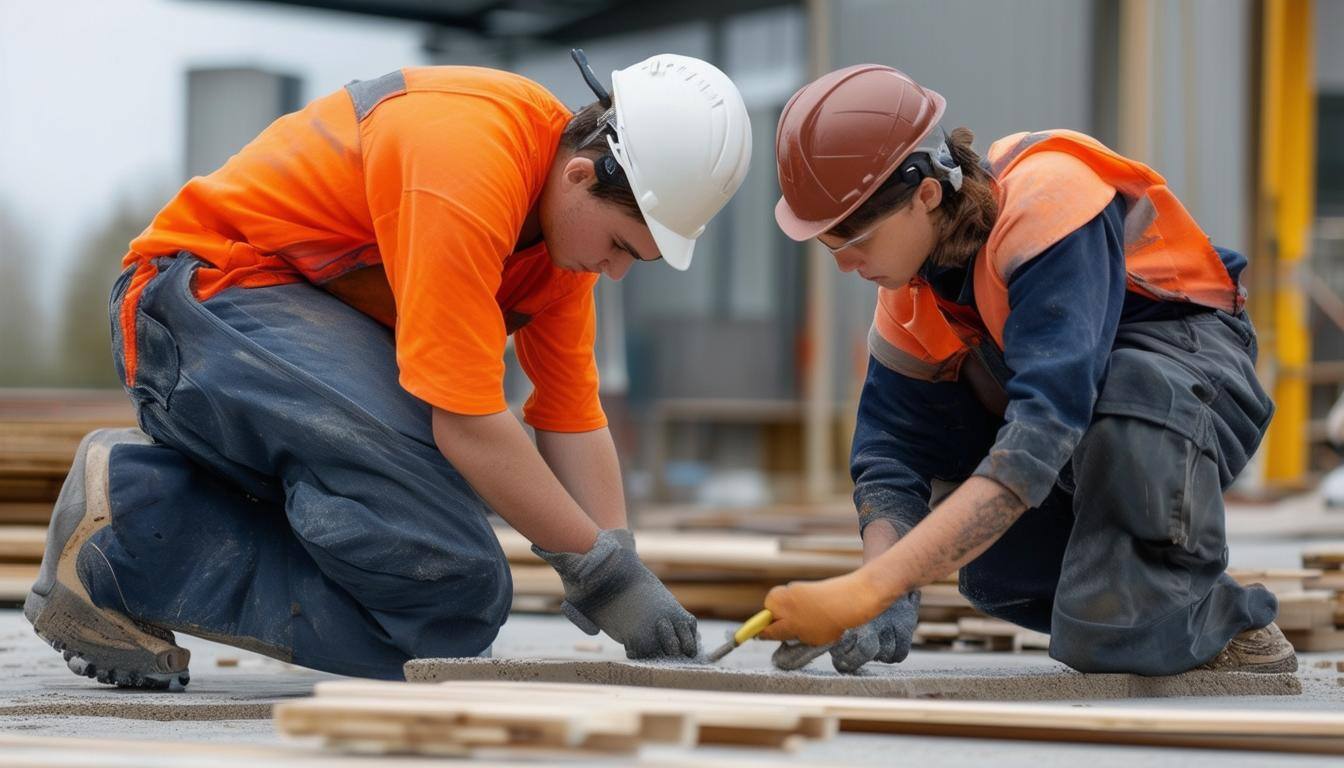.png)
Latest News
Contractors Given Stark Bribery Warning
A building engineering services contractor whose life was destroyed by a bribery and corruption scandal has issued a blunt wake up call to other business leaders who he fears could fall into the same trap.
Speaking to Building Engineering Services Association CEO David Frise on the Behind the Built Environment podcast, Andrew Blunsdon admitted to being naïve and acting under client pressure when he provided “favours” that eventually led to him pleading guilty in court to two counts of bribery.

He was sentenced to 12 months in prison, suspended for two years, and ordered to do 150 hours of community service. Being forced to pay for his own legal defence has left him financially ruined but he said the wider emotional impact on him and his family was even worse.
The managing director of the now defunct firm Priddy Engineering found himself caught up in a major fraud investigation into how contracts were awarded on E.ON energy projects between 2011 and 2015. He was accused of doing favours for key figures at the energy giant to win work including providing a free-of-charge air conditioning unit, and making payments to a sub-contractor that were redirected to a business connected to one of E.ON’s senior directors.
In his defence, Blunsdon said he was unaware of any criminal conduct at the time and carried out these favours in good faith. Looking back, he admitted to Frise that he was naïve and failed to carry out in-depth background checks that could have saved him years of distress and financial ruin.
“While he made serious errors of judgement, Andrew never set out to commit a crime,” Frise told his podcast audience. If you've ever thought, just help a client out and ask questions later. This is the story you need to hear.”
Eventually charged under the Bribery Act, Blunsdon pleaded guilty, but by then his business had collapsed and his pension savings had been used up to pay his legal costs.
He admitted to being caught up in the excitement of his two-year-old firm becoming a supply chain partner for such a major client. This meant he was eager to please influential figures at E.ON.
“The opportunity to become a supply chain partner to an energy giant was just amazing,” he told the podcast. “It was incredible the due diligence we had to go through…and that just added to that excitement really to be part of that journey to work on the statutory side of a building as opposed to the muck and bullets of contracting.
“So, we threw everything at it. And the people that you are dealing with…you just don't expect them to have a sinister motive. My failing as a person is I am always too trusting. I wish I was tougher. I think my business would have been saved if I was a tougher individual,” said Blunsdon.
He urged contractors to learn from his mistakes and ensure they have bribery and corruption policies in place. “The key thing is to take your quality systems seriously,” he told Frise. “They are documents that are really, really important and you never know how important until something happens to you.
“Health and safety is quite easy to understand…but anti-corruption and bribery was really new at the time…but you still should know the difference between right and wrong. And you should have a culture within a business that you know is able to differentiate those things.”
Blunsdon said he still believed he was a good person who “did something bad” and he took full responsibility for it. “I accepted what happened to me pretty quickly once the law was explained to me. I should have done better, should have been stronger as a person” and he urged other business leaders put in a similar position to “just say no”.
“This doesn't smell right. Sound right, can’t be right….get them to explain more. Be stronger, be tougher and not be worried about losing the work as a consequence. Stick to your own values…be an honest trader.”
Andrew’s wife Tina also appeared on the podcast to explain the huge impact on the couple’s family, friends and the wider community as well as her own working life.
“When that [legal] letter came, it just destroyed our lives,” she said. “Even I had to get my own barrister team to defend myself against Andrew because of the property and my pension, which cost an awful lot of money.”
She said telling their parents was extremely difficult and their children were also deeply affected. “It was awful. Our children had to help, and they made choices in case Andrew went to prison because we were told to prepare for the worst.
“So, for me to come here today has been massive, but I think it's a story that men need to hear about what they can do to their partners and their families, because [those] decisions to be helpful have cost us dearly.”
Frise urged all contractors to heed Andrew’s warning: “We talk a lot in this industry about risk, technical risk, commercial risk, reputational risk, but the human risk of just going along with what a client asks without checking, without challenging, without protecting yourself is enormous.”
He added that, while this was an instance where a contractor fell foul of the Bribery Act, this could have been any breach of the law including anti-money laundering or the Building Safety Act.
“Andrew’s case shows how quickly trust can be exploited, how slowly justice can move and how devastating the fallout can be, not just for individuals, but for their families and businesses. So, if you are listening and thinking, this could never happen to me, stop and think again.”
Budget Was ‘Mixed Bag’ for Skills, Says BESA
The Building Engineering Services Association (BESA) says last week’s Budget was “not a good one for large employers involved in apprenticeships”.
While Chancellor Rachel Reeves did make some positive announcements, including fully funding under-25 apprenticeships for SMEs; the increase in the minimum wage, a reduction in the number and range of apprenticeships available and speeding up the withdrawal of levy funding were all negatives, the Association said.
“It was a really mixed bag,” said BESA’s director of competence and compliance Jill Nicholls. “Our large members will be affected quite significantly for the worse, but SMEs have an opportunity to start engaging with apprenticeships and can take advantage of some new incentives."

“However, a lot of employers were already reducing their intake because of rising employment costs before the Budget, so the increase in the minimum wage will simply exacerbate an already worrying situation,” said Nicholls.
Minimum hourly rates will rise from April 1 next year by 6% for 16–17 year-olds to £8, for 18-20 year-olds by 8.5% to £10.85, and for 21-year-olds and over by 4.1% to £12.71. The minimum hourly rate for apprentices will also rise by 6% from £7.55 to £8. These follow the increases introduced last year alongside a significant rise in employers' National Insurance contributions.
Use it or lose it
The Chancellor also announced that unused apprenticeship levy funding would expire after 12 months and return to the Treasury’s coffers – so employers would have to “use it fast or lose it”, BESA warned.
This is part of the government’s wider plan to reform apprenticeships and the Growth and Skills Levy, with the intention of increasing flexibility and availably of funds for apprenticeships and broader skills training.
It wants to simplify the apprenticeship system and make it more efficient as short courses are introduced from April 2026. Apprenticeship Assessment Plans will be reviewed for all occupations and the suite of apprenticeship standards available will be streamlined. This will lead to some occupations being removed completely, impacting the competency frameworks, explained Nicholls.
She did welcome the decision to fully fund under-25 apprenticeships for SMEs (employers currently pay 5% of the cost) and reduce national insurance contributions for this age group. There are also new incentive payments for companies who take on young apprentices aged 16-18 as part of the government's strategy to get more NEETs (young people not in education, employment or training) into the workforce.
The Chancellor also announced £1.5 billion worth of support for NEETs through the Youth Guarantee and the Growth and Skills Levy, designed to give all young people aged 16-24 years old access to the support they need to earn or learn.
The government will guarantee a six-month paid work placement for every eligible 18-21 year old who has been on Universal Credit and looking for work for 18 months. This will cover 100% of employment costs for 25 hours a week at the relevant minimum wage, and additional wraparound support.
“So, it was good news if you are in the NEET bracket or an employer willing to take on a young person, but we have a bigger problem with apprenticeships across construction and the built environment where employers are grappling with major increases in their costs," said Nicholls.
“This is a technical industry that needs a steady flow of people trained to a high standard to meet the competence levels against which we are (rightly) being measured. This requires a robust, well-financed and wide-based apprenticeship system supported by employers who have the confidence to invest in emerging talent because they can see a clear growth pathway ahead,” she added.
“In that sense, the Budget was something of a disappointment for many BESA members.”
For support with apprenticeships and other training and skills issues contact the BESA Skills Advisory Service here.
Small Firms ‘Overwhelmed’ by Building Safety Regime
Better communications and more consistent enforcement are needed to improve compliance with the Building Safety Act, according to speakers at last week’s London Build Expo.
A lively panel session informed by new research from the Building Engineering Services Association (BESA) debated the need for more targeted information about the Building Regulations, stronger enforcement, and sector specific training to overcome the barriers to compliance reported by the SMEs and micro-businesses that make up 99% of the construction sector and its related professions.
BESA’s director of specialist knowledge Rachel Davidson told the busy event at the Olympia exhibition centre in London that 88% of the industry’s professionals were aware of the Act but most SMEs found the legislation “overwhelming and daunting” and felt “left behind”.

“This is critical because those companies are the lifeblood of the industry,” said Davidson. “There are also a lot of people who still think the legislation only applies to HRBs (higher risk buildings).”
BESA’s second annual survey of the sector’s response to the legislation also showed that many clients were carrying on with “business as usual” meaning they continue to prioritise cost and speed over safety. “A lot of this comes back to leadership and culture,” said Davidson. “78% of companies tell us that this is important to them but fewer than half report having taken enough action.”
Enforcement
She said that building engineering contractors were increasingly calling for clear and consistent enforcement of the legislation because “unless there are consequences, clients will continue to think compliance is optional”.
Davidson added that BESA was delivering more guidance to help firms see “what good looks like” in their sector. “It is also important to reassure people that they don’t need to know or understand everything about the Act – they should focus on the parts they can control and their specific roles and responsibilities.”
Fellow panellist Hannah Carpenter from the Building Safety Wiki said the communication challenge was enormous because of the size and diversity of a sector that employs 2.6 million people. She said the message would need to go beyond compliance to address behaviour and encourage people to take pride in their work.
“We need to be innovative about how we communicate and appeal to personal values because that is going to be more effective than continually talking about regulation,” said Carpenter. “But getting 2.6 million people to pull in the same direction is a huge challenge.
“We need to ask people why we are doing this [which is] to keep people safe and make sure the Grenfell tragedy cannot happen again. That means talking about ‘purpose’…people should want to make a difference. This can’t just be about ticking boxes.”
She called for greater use of “non-traditional communication routes” and partnering with organisations like HMRC who already had strong connections to individuals and small construction businesses.
This could help to overcome part of the problem of an industry which only has an average reading age of 11, according to Hertfordshire Building Control CEO Gary Cass. He said there were definite signs of progress at the top of companies but getting the message about improving behaviour and doing the right thing further down the work chain would take longer.
On planning, he said the new team running the Building Safety Regulator (BSR) had made rapid progress on reducing the backlog at Gateway Two for HRBs with the average time for an application to be approved now down to 17 weeks – it was a high as 38 earlier this year.
Cass said the BSR had been “very honest” about its failings and was now moving in a more positive direction, but the success of its mission would rely on closer collaboration with the industry.
“However, the industry needs more education about the Building Regulations,” he said. “People need to be looking at compliance and focus on what is required in the regulations not guidance. Building Control Officers are regulators first and foremost but the industry used to rely on them to guide them through the process…and now it needs to be educated [about how the new process works].”
He added that enforcement could be done “in a positive way” and should not just be about taking legal action. However, the number of BCOs had plummeted leaving the industry with a serious resource problem, including a significant shortage of experienced inspectors.
Ventilation Saved My Kids
Healthcare professionals need to be better informed about the lifesaving impact of ventilation in homes, according to a headline speaker during the fourth annual World Ventilation Day (WV8D).
Garry Ratcliffe, whose family featured on the BBC’s DIY SOS programme, said his damp and poorly ventilated home was “slowly killing my kids” before it was completely rebuilt and equipped with a customised domestic ventilation system.
Three of Ratcliffe’s four children have complex disabilities and Curly, who was not expected to live beyond the age of one because of his severe cerebral palsy, recently celebrated his 15th birthday.
Speaking at an event organised by the Building Engineering Services Association, Ratcliffe said his son was hospitalised repeatedly with serious respiratory problems until the indoor air quality (IAQ) at home was dramatically improved. He has only had to be admitted three times in the nine years since.

“Ours is a story with a happy ending, but thousands of children are not so lucky,” he told BESA’s Ventil8 Day Exchange at the Building Centre, London. “Healthcare professionals rarely ask about a child’s living conditions even when they present repeatedly with breathing problems, but they should be having a conversation about ventilation.”
Pressure
Wider health and well-being considerations have led to GPs prescribing gym memberships in a bid to relieve the pressure on the NHS, and air quality should be the next focus, Ratcliffe believes.
As CEO of the Golden Thread Alliance of nine primary schools in Kent, he also said there was a role for the education sector. “Many children come in to school sick and not having slept well, so we should also be having that conversation about their living situations.”
He paid tribute to the team at BESA member company Farmwood M&E who developed, installed and continue to monitor the family’s closely controlled ventilation system. He urged the industry to develop more small scale retrofit solutions for homes and schools so “other families can have our happy ending”.
WV8 Day is a global initiative (#WorldVentil8Day) supported by industry bodies, universities, and environmental groups worldwide and takes place on November 8 every year. It aims to raise awareness of the vital role played by ventilation in tackling condensation, overheating, mould and damp in both residential and commercial buildings.
BESA’s ‘Ventil8 Day Exchange’ also featured a call for a public information campaign about the dangers to health posed by poor ventilation standards from the Association’s IAQ Group chair Adam Taylor.
“The UK had successful campaigns in the past for smoke alarms and carbon monoxide, so why not air quality in homes? It is probably because of the speed with which people die, so it is not given the same urgency, despite being responsible for many more deaths and an epidemic of respiratory illness,” said Taylor.
One solution for the UK would be to impose a legally mandated approach to ventilation system maintenance, like the one in place in Sweden, according to Taylor.
The high-profile air quality campaigner Rosamund Adoo Kissi-Debrah CBE also urged the industry to step up its efforts to improve public awareness of available solutions. She called for the industry to put its weight behind a proposed new Clean Air (Human Rights) Bill, dubbed ‘Ella’s Law’ in memory of her nine-year-old daughter who died as a result of air pollution in 2013.
The proposed law has cross-party support and had its second reading in Parliament the day after the BESA event. It is designed to force the UK to adopt new World Health Organisation (WHO) air quality limits by 2030. It also references new research from the Royal College of Physicians, which provided evidence showing air pollution had a detrimental impact on almost every organ in the body.
“We have been talking about this for years, but now is the time for the industry to produce guidance that clearly sets out what people need to do to reduce the risk in their buildings,” said Kissi-Debrah who is honorary president of the BESA IAQ Group."
Frustrated
“People are frustrated by ongoing government inaction but also the lack of clarity about what actions they should take.”
Taylor said it was a source of “huge disappointment” that Part F of the UK building regulations covering ventilation standards was recently updated but referenced out-of-date WHO limits. “We need to lobby hard to get this changed,” he told the World Ventil8 Day exchange event. “Otherwise, this guidance will hold us back for decades.”
The theme of this year’s World Ventil8 Day was ‘Collaborate to Ventilate’ and the BESA event heard repeated calls for the industry to stop working in ‘silos’ and share solutions and best practice. “There is lots of great work going on that people don’t even know about,” said Taylor.
New legislation known as ‘Awaab’s Law’, which came into force on October 27 requiring social landlords to address mould and damp in their properties within 10 days, was welcomed by speakers at the BESA event. However, several pointed out that the law did not address the root causes of these problems – and could end up with ‘sticking plaster’ solutions that still left tenants’ health at risk.
Ian Gregory, chair of BESA’s Ventilation Hygiene group, called for wider and better quality monitoring of IAQ in homes as this would give building occupants a deeper understanding of their living conditions.
“My fear is that Awaab’s Law will lead to more people painting over mould or using bleach to clean it off the walls, which will actually make the problem worse…80-90% of mould is hidden in the fabric of buildings continuing to cause harm.”
For more information about BESA’s ventilation projects and resources visit the website here.
Vent Hygiene Sector Takes up Competence Challenge
The Building Engineering Services Association (BESA) has launched a wide-reaching consultation to establish a framework for defining a route to professional competence in ventilation hygiene.
The consultation, which closes on November 16, will form an integral part of a wider built environment exercise to drive up competence standards and embed best practice in line with safety concerns raised by the Grenfell Tower disaster inquiry.
The catastrophic fire led to a comprehensive review of the building regulations and the implementation of the Building Safety Act leading to a renewed focus on how individuals can demonstrate their skills, knowledge, experience and behaviours (SKEB) and companies their organisational capability, in the face of increasing legal and insurance scrutiny.
.jpg)
BESA is working with the Industry Competence Steering Group, which has been tasked by the Building Safety Regulator with helping employers in every built environment specialism define and demonstrate competence.
Ventilation hygiene is one of these key specialisms and the Ventilation Hygiene Competence Group (VHCG) was created to lead the development and implementation of competence frameworks for hygiene standards in both air and grease extract systems. The group is made up of employers who spent more than a year developing the draft framework.
Opportunity
They are now asking anyone with an interest in the sector to take this “once in a generation opportunity” to help shape the future of the profession’s skills, competence and compliance.
“There is currently no higher profile issue than how specialist sectors evidence the competence of individuals and companies,” said BESA’s director of competence and compliance Jill Nicholls.
“The Grenfell inquiry brought welcome focus on the need for everyone in our industry to have the right SKEB for the specific tasks they are asked to do in buildings – and be able to prove it. That is why BESA is giving so much time and attention to this consultation,” she added.
“We simply must get this right, so we need everyone with skin in the game to help us shape these frameworks for the benefit of both the industry and the building users that rely on our work.”
The consultation is looking for feedback on the group’s draft framework Managing Competence for Ventilation Hygiene Activities, which proposes a route to validate and revalidate individual competence that could eventually be applied throughout the UK.
The VHCG has put forward recommendations building on existing documentation, such as existing National Occupational Standards (NOS). It has also created a functional map and a framework of competencies, which breaks work down into discrete activities and sets out SKEB standards, in line with the requirements of the new building safety regime.
The statements are also mapped back to other relevant standards and frameworks, and there will be a second phase to tackle competence in surveying and auditing, which is currently out of the scope of this exercise.
The consultation is also seeking views on routes to competence, including requirements for initial and ongoing demonstration of SKEB, validation and periodic revalidation of competence evidence. This includes routes for new entrants and experienced workers.
An implementation plan is also being drafted to help turn “theory into reality” including work towards the detailed training and assessment content that will be needed to underpin sector competence.
Anyone wishing to take part in the consultation can access the relevant documents here and completed forms should be emailed to consultation@thebesa.com by 16th November 2025.
BESA is also hosting a World Ventilation Day event on November 6 in London, which will consider the health, well-being and economic value of better building ventilation – sign up for free here.
BESA Launches Training to Support Heat Network Regime
The Building Engineering Services Association (BESA) has launched the first official training course supporting the government’s Heat Network Technical Assurance Scheme (HNTAS). HNTAS will be phased in over time once policy proposals are consulted on and finalised. This is to ensure the sector has sufficient time to understand and take action to comply with the scheme.

BESA Academy is the government appointed ‘shadow training provider’ for the new regulations and has established a training pathway, which is designed to upskill the industry in preparation for the new regulatory regime.
The training was developed by the Department for Energy Security and Net Zero (DESNZ) and the content designed by BESA Academy which is delivering the course via its online learning platform.
Introduction to Heat Network Technical Assurance Scheme is the first in a planned series of courses to support the new regulations and is available free of charge* thanks to the government’s heat training grant scheme. Individuals and organisations are being invited to register now on the BESA Academy’s Online Learning Platform.
“The launch of this training is a major step forward for industry readiness,” said BESA’s director of competence and compliance Jill Nicholls. “HNTAS will become a crucial framework for compliance and performance, and BESA is delighted to be able to deliver the training that will make sure our industry is ready.”
“The future success of this critical low carbon technology depends on having a fully trained, competent workforce. This will also ensure a better experience for heat network end users.”
Mandatory
HNTAS will introduce mandatory minimum technical standards for all GB heat networks designed to improve performance, energy efficiency, reliability, and consumer protection. It also plays a key role in supporting the government’s decarbonisation of heat policy ambitions under the Heat Network Transformation Programme.
The scheme has also been designed to complement the competence requirements established by the Building Safety Act and the Building Regulations, particularly where communal and district systems are part of multi-occupancy developments.
The course introduces HNTAS and explains the rationale behind the scheme. It also covers the structure and elements of heat networks, roles and responsibilities under the new regulations, and how compliance will be assessed and certified. The course focuses on the context of HNTAS and its current state of development.
Although some proposals are liable to change following the Government’s consultation later this year, this course is being made available now due to industry demand. Once proposals have been consulted on, some changes may need to be made to the Introduction to HNTAS course to ensure course content aligns with the finalised policy position. Where required, updated courses highlighting where content has changed will be made available to attendees.
The training is funded* by the Department for Energy Security and Net Zero (DESNZ) and is aimed at developers, consultants, contractors, operators, and local authorities, as well as anyone involved in the planning, design, or operation of heat networks.
“This is a valuable opportunity for individuals and businesses to get a head start by strengthening their knowledge, future-proofing operations, and accessing the commercial opportunities the newly regulated market will create.” said Nicholls.
The government has also agreed a second round of funding for BESA Academy’s Heat Networks 1: Installation and Maintenance Course, which is a comprehensive blend of online theory and hands-on practical training and is designed to meet the rising demand for skilled heat network professionals.
The course, now fully funded* until March 2026, was developed in partnership with the Manufacturers of Equipment for Heat Networks Association (MEHNA) and the Thermal Insulation Contractors’ Association (TICA) to help engineers “upskill and gain cutting-edge knowledge and skills”. It is being delivered at Worcester Bosch and BAXI training centres.
Other Heat Network Courses
BESA Academy also provides a Heat Networks Foundation Course covering design, operation and management of heat networks, providing the trainee with an overall awareness. It is aimed at people already working in the building services industry, either technical or non-technical, who are interested in improving their understanding of the technology.
This introductory course covers basic principles and key components of a heat network including diversified loads, heat interface units (HIUs), water treatment and the basics of thermal insulation for secondary systems.
For more information about all the heat network training courses visit the BESA Academy learning platform.
*Fully Funding: RRP £450 +VAT
If you work in England, you are eligible to access this course completely free of charge.
To receive your discount, simply email us with proof of your employer’s address (for example, a company letterhead of official email signature).
Once verified, we’ll send you a 100% discount code to use at checkout.
This offer is available exclusively to learners employed in England.
Funding is available until 31st March 2026.
This course is hosted by BESA Academy on behalf of DESNZ for the Heat Network Technical Assurance Scheme.
Visit the BESA website to Find Out More
BESA Welcomes Chance to Solve Late Payment ‘Once And For All’
The Building Engineering Services Association (BESA) has welcomed a new consultation launched by the government as a “once in a generation” opportunity to tackle the ongoing threat to small engineering businesses posed by late payment and retentions.

The consultation, which is part of its wider Small Business Strategy, will seek answers to a problem that has been undermining SMEs in construction-related sectors for decades and continues to force many small specialist engineering firms into insolvency.
The strategy contains legislative and regulatory measures designed to improve payment practices among large companies and a range of other measures to support SME growth. The government is considering proposals to increase transparency and accountability among large firms responsible for paying supply chain partners and the potential abolition of retention payments.
According to a recent Federation of Small Businesses report, 52% of small businesses (around 2.8 million firms), continue to be seriously affected by late payments. Over a quarter admitted they had to rely on expensive short-term financing to plug gaps in their cashflow, and many have been forced to write off late payments as bad debts, due to the time and cost involved in chasing up money owed.
Under draft legislation, the Companies (Directors’ Report Payment Reporting) Regulations 2025, companies with more than 250 employees will be required to disclose their payment performance in their annual reports. This will include data on how long it takes to pay suppliers, and the percentage of payments made within agreed terms.
The aim is to increase transparency and accountability. Currently, payment data is submitted to a government portal, but this is not widely viewed. Embedding payment performance in annual reports instead would make poor practices more visible to clients and potential suppliers.
Audit committees could also be given greater responsibility for overseeing payment practices and holding executive teams to account.
“Today’s policy announcement and consultation confirms that the government understands the need for reform backed by legislation and that the industry must make the necessary changes to its payment culture,” said BESA’s Legal and Commercial Director Debbie Petford.
“We have been waiting a long time for proper late payment legislation backed up by real enforcement. We encourage companies from across the engineering services sector to take this once in a generation opportunity to put forward their solutions and help lay the foundations for a future business environment in which they can thrive – not just survive.”
She added that a succession of ‘voluntary’ pledges on late and unfair payment over the years had not helped the cause of sub-contractors struggling to claim fair payment “for work they have completed in good faith”.
“The collapse of ISG last year demonstrated just how vulnerable small contractors are to insolvencies further up the supply chain. Too many perfectly good businesses have been lost because they have been denied the lifeblood of healthy cash flow,” said Petford.
“This consultation is the opportunity we have been calling for to address this blight on our industry once and for all.”
BESA said it would be contacting its members to explain how they can take part in the consultation.
BESA members can also access expert advice and support from the Association’s legal team on all payment, contract conditions and insolvency matters here.
Companies Warned Not to ‘Fake’ Diversity
Built environment firms shouldn’t do anything about improving the diversity of their workforces if they don’t truly believe in it, according to a leading construction industry diversity champion.

Amos Simbo OBE told the latest edition of the ‘Behind the Built Environment’ podcast that firms would be better off doing nothing if they were just responding to pressure from their clients.
“If you're faking it rather than actually doing it, you're just wasting your time,” said Simbo, founder of the Black Professionals in Construction (BPIC) network. “You might as well use your resources properly because what's the point of investing in something and then just going halfway?”
Simbo told podcast host David Frise, CEO of the Building Engineering Services Association (BESA), that companies who only acted on diversity because their clients forced them into it would not see any benefit.
“[Then] what will happen…companies would employ people, but they're just not empowered to do anything. So…you're [just] wasting money on employing those people. In that case, it would be better to do nothing at all because you won’t get anything out of it.
“For companies of all sizes, authenticity matters…so go all in, make it real. Inclusion isn’t a trend; it’s good business,” he added. “And even if you don't want to go all out, try and do the bare minimum properly, at least. Then you can say, you know what, we're not doing everything, we're just doing this, but we're doing it properly…we’re committing.”
Success Stories
Currently, just 7% of workers in cons
